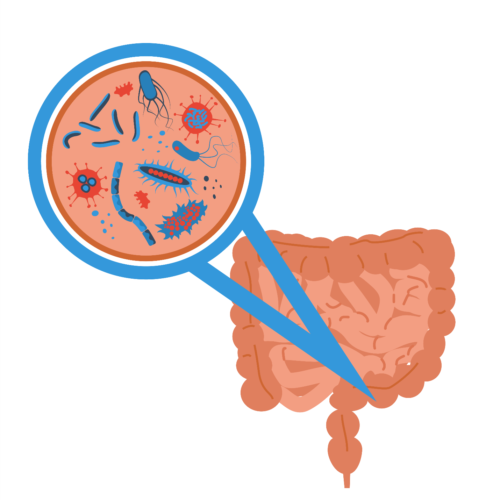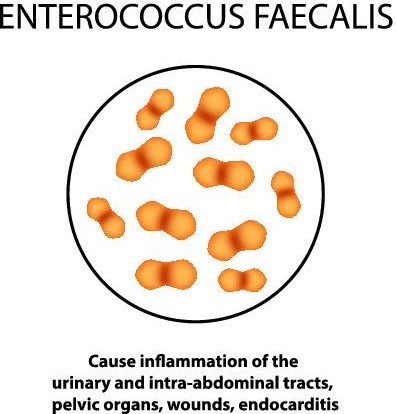
I hate to be the messenger of bad news but sugar causes havoc with your gut flora! By “flora,” I mean the bacteria and other microscopic creatures that live symbiotically in your gut.
You’ve no doubt heard about “good bacteria” and “bad bacteria.” In a woman with a healthy gut, her “good bacteria” will far outweigh her “bad bacteria.” She’ll also have a healthy balance of bacteria species. Furthermore, the collection of Candida species, a harmful type of yeast, will only be present at low levels.
If you eat too much sugar, you’ll make the environmental conditions in your gut just perfect for the harmful Candida species to thrive and the bad bacteria to start out-competing your good bacteria. Basically, the balance of your gut flora gets totally out of whack if you eat too much sugar all the time.
Women seem to be especially vulnerable to the excess sugar: Candida infections are renown for causing recurring vaginal yeast infections in women, which can be really irritating and difficult to get rid of. They can also interfere with your love life. If you have recurring vaginal yeast infections, Candida is very likely invading other tissues all around your body as well. This is why you may start to feel exceptionally tired and achy if you have a vaginal yeast infection. Even worse, Candida can cause leaky gut syndrome where the lining of your gut becomes so porous it leaks out its contents into your bloodstream! This can cause blood poisoning, chronic fatigue syndrome, food intolerance, painful joints, and autoimmune diseases.
There is a fascinating 2012 research paper by a team of scientists at University of British Columbia in Canada that covers how your gut flora affects your health in a much more detailed way (just bacteria, they do not cover Candida). The full paper is actually available online for free (most research papers are not). As you can see, the study is entitled “Diet-Induced Dysbiosis of the Intestinal Microbiota and the Effects on Immunity and Disease.”
Dysbiosis is just a fancy word for an imbalance in your gut flora. Microbiota is another term used for gut flora. Actually, microbiota covers also the environment where these Lilliputian creatures (so the gut flora) are living.
You’ll also find 173 links to other research studies on how the bacteria and yeast in your gastrointestinal system can affect your health… everything from autism to diabetes. Some of these articles are not provided for free but you’ll at least be able to read the abstracts for free and some of the papers linked are free.
And this is just a start…
With an imbalanced gut flora, your health can deteriorate in many ways! Let’s take a look at some details:
If you eat a high sugar diet, your gut flora will start to have too many of the following bad bacteria:

Enterococcus species
Enterococcus species cause diverticulitis. They can also easily move into your urinary tract and cause urinary tract infections. In some cases – especially if you have leaky gut after eating gluten-filled foods or if you have Candida overgrowth – these species will move out of your gut and into your circulatory system. From here, they can cause bad infections in every organ in your body. For example, they can cause endocarditis, an infection of the inner lining of your heart. They can even attack your brain and spinal cord, causing meningitis.
Clostridium innocuum, Catenibacterium mitsuokai, and Eubacterium dolichum
These are all pathogenic bacteria that are highly resistant to antibiotics. This means you can end up being hospitalized for infections caused by too many of these bacteria building up in your system. They can even become life threatening!
If you eat too much refined sugar like table sugar added to your coffee, sweet treats, and sugary cereals, your gut may start to build up too many of these bad bacteria species:
Clostridium difficile and Clostridium perfringens
Both of these bacterial species are famous for causing foodborne illness because they are also found on foods like raw meats (which you won’t be consuming on a keto-vegan diet!). These species can cause severe diarrhea and life-threatening inflammation in the lining of your gut.
Your Gut Flora Is an Important Part of Your Immune System!
Here’s a fun fact you can share at the next party when people are sitting around playing, “Did you know…?”

One day, a crazy scientist got the outlandish idea to breed a special strain of mice that lacked all gut flora. You might guess that these extra sterile mice would be extra healthy, right? WRONG! They were the sickliest mice because they couldn’t fight off even the simplest infection, even while living in the lab under pristine conditions. These mice would not have lasted even a day in the wild! A human being without gut flora wouldn’t last very long either.
Our gut flora, the whole complicated assemblage of bacteria and yeast, is a big part of how we ward off pathogenic infections. If we don’t have our gut flora – or it becomes way out of balance like in most people nowadays – we are much more prone to infections and inflammation.
Furthermore, an unbalanced gut flora, due to eating too much sugar, makes us more susceptible to autoimmune diseases, where a contributing factor is our own immune system attacking our own bodies. Believe it or not, examples of autoimmune diseases include obesity, type 1 diabetes, hypothyroidism, ulcerative colitis, asthma, and some metabolic diseases. Scientists have only begun in the last decade or so to fully realize just how important our gut flora is to maintaining good health and staving off these autoimmune diseases.
Moreover, our gut is our second brain. There is a straight connection from your gut to your brain. If your gut is damaged, your brain won’t work either. Let me give an example: you must know that serotonin is one of our most important neurotransmitters, affecting for example to our mood. But did you know that your gut – when it’s healthy – makes 90 % of the serotonin in your body? And when your gut is not healthy, well, you guessed it: your gut doesn’t make serotonin and you end up being depressed, angry, and anxious. I admit, I’ve been there, too.
Homework Assignment
The next time you are out grocery shopping, take special note of how many grams of sugar are in the different brands of vegan yogurt. You’ll suddenly realize how ironic it is to being yogurt, in part for the probiotics to help balance your gut flora, only to also simultaneously consume so much sugar that it throws off the balance of your gut flora.
You’d do more service to your gut, to make sugarless homemade plain vegan yogurt – made for example with coconut milk – and add fresh berries with fiber for sweetness and a few nuts for protein to balance out the ill effects of sugar.

Leave a Reply
You must be logged in to post a comment.